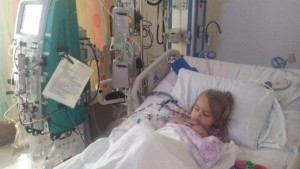King County Public Health is investigating six E. coli cases that appear to be linked to a food truck that visited farmers markets.
 “Through a few initial interviews with ill people, we determined that everyone who became sick had something in common – they ate food prepared by, a local food vendor called Los Chilangos,” Public Health staff said in a statement.
“Through a few initial interviews with ill people, we determined that everyone who became sick had something in common – they ate food prepared by, a local food vendor called Los Chilangos,” Public Health staff said in a statement.
The department required the food truck to stop selling food.
A 4-year-old girl is one of those affected, and her mother said her daughter became sick after eating at Los Chilangos around August 8.
The food truck visited the Issaquah and Sammamish farmers markets.
Deanna Buder said her 4-year-old daughter started experiencing pain and swelling in her abdomen, and stopped eating. Tuesday is her seventh day at Seattle Children’s Hospital.
 Los Chilangos serves food at seven farmers markets in King and Snohomish counties, operates two food trucks, and also caters events. Los Chilangos uses Eastside Commercial Kitchen, where they share space and equipment with about a dozen other food businesses.
Los Chilangos serves food at seven farmers markets in King and Snohomish counties, operates two food trucks, and also caters events. Los Chilangos uses Eastside Commercial Kitchen, where they share space and equipment with about a dozen other food businesses.
The kitchen was told to stop producing food, as were the food trucks that used it.
“We are still investigating the source of the E. coli,” the Public Health statement said. “If we determine that a food contained the E. coli bacteria, we will try to trace it back to stores, suppliers, and even farms to address the root of the problem with corrective actions, if possible.”
King County Public Health released the key steps of their investigation:
- We [King Co. Public Health] interviewed people who got sick.
“At this time [Tuesday afternoon], six people have been infected with the same strain of E. coli (three have been hospitalized). When Public Health determines that anyone is sick from a serious foodborne illness like E. coli, we [King Co. Public Health] interview them to determine what may have caused their illness. We [King Co. Public Health] do this to find the source of the outbreak and prevent others from getting infected. In this instance, through a few initial interviews with ill people, we [King Co. Public Health] determined that everyone who became sick had something in common – they ate food prepared by a local food vendor called Los Chilangos. Public Health took swift action and required Los Chilangos to cease operations.”
- We [King Co. Public Health] investigated a food business that was associated with the people who got sick.
“But we [King Co. Public Health] didn’t stop there. Los Chilangos serves food at seven farmers markets in King and Snohomish Counties, operates two food trucks, and also caters events. Los Chilangos utilizes a shared kitchen space, called a commissary kitchen. The kitchen that they use is Eastside Commercial Kitchen, where they share space and equipment with about a dozen other food businesses.”
- We [King Co. Public Health] intervened at the specific site and operation.
“The condition of the commissary and the potential for cross contamination were deemed an imminent health hazard, and the health officer issued a cease and desist order to the commissary on Thursday, August 27. Additionally, all of the food vendors permitted by Public Health that use this kitchen were also told to cease operations. Recognizing that this lapse in operation hurts business, our team has worked diligently with these vendors to find new places for them to resume their work and remind them about important food safety measures.”
- Next steps: tracing the source
“As of today, the investigation isn’t over. We [King Co. Public Health] are still investigating the source of the E. coli. If we determine that a food contained the E. coli bacteria, we will try to trace it back to stores, suppliers, and even farms to address the root of the problem with corrective actions, if possible.
But, it’s possible that the source of E. coli may never be determined. E coli is often linked to beef, but it can also be linked to produce, such as spinach and sprouts, along with a variety of other foods such as unpasteurized juices, raw milk, game meats, and other common foods.
For outbreaks such as this one, we [King Co. Public Health] continue to monitor the situation and look for other common factors among ill people. While we know Los Chilangos is linked, they may not be the only ones involved. For instance, the source of E. coli could be served by other vendors.
We [King Co. Public Health] are currently working with all of the businesses connected to this outbreak to make sure that they are not using any products that may have become contaminated and that they have food safety measures in place. This includes having the businesses address needed repairs to their equipment, providing education to their staff, and ensuring their operations are safe to open.
Though Los Chilangos has been linked to this outbreak, they deserve credit for their dutiful cooperation during our investigation. No food vendor wants to make people sick, and we know everyone is very concerned about the people who have become ill. We will be updating this blog as the picture becomes clearer.”
